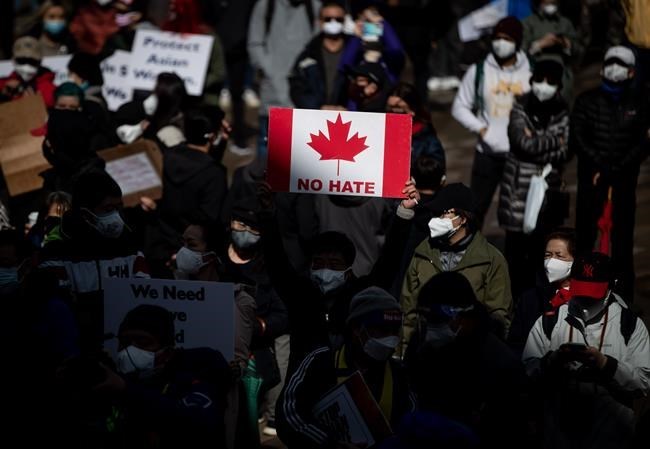
A person holds a Canadian flag sign with the words "No Hate" on it during a rally opposing discrimination against Asian communities and to mourn the victims of those affected by the Atlanta shootings, in Vancouver, on Sunday, March 28, 2021. THE CANADIAN PRESS/Darryl Dyck
Republished June 29, 2022 - 4:30 PM
Original Publication Date June 29, 2022 - 11:46 AM
A few weeks ago, Toronto teacher Nigel Barriffe said he spoke to a young, Black colleague who had entered a classroom after lunch to find a racial slur and swastika etched on a school locker.
"We know that many of our Jewish students and families have had racist epithets thrown at them. We know our Muslim students and families have been under attack for years," Barriffe said Wednesday.
Barriffe and members of the Canadian Anti-Hate Networktold a news conference about scenarios that are described in a new online booklet that aims to educate parents, teachers and students on how to identify and confront various forms of hate in classrooms and online.
The booklet was created by the network, a group that monitors hate groups and researches extremism in the country. It includes examples from educators and community members across Canada and provides steps on how to support impressionable children.
It describes the ways a parent or teacher can intervene when they believe a student is being radicalized by a hate group. It also includes workshops and defines various extremist ideologies.
Elizabeth Simons, deputy director of the network, said the scenarios increase in severity as you flip through the document.
"Everything in the tool kit is real examples that we have found," she said.
"You start with anonymous, hate promotion so that could be graffiti, that could be the swastika on the desk. You don't know who's behind it, but it's happening and you have to deal with it.
"Then it escalates all the way to overt (hate groups recruiting students and) organizing within the school community and outside the school community."
The federal government is spending $35 million on 175 anti-racism projects across the country, including the booklet.
Bernie Farber, chair of the network, said hate crimes involving children and adults have surged and silence is no longer an option.
He said there have been recent hate attacks involving youth, including the beating of a Black Edmonton student allegedly by seven other students who were screaming racial slurs. There have also been numerous cases of students distributing hate-promoting flyers.
"I had a meeting today with the York Region School Board (in Ontario) who indicated to me racial incidents … have gone up to heights that they have not seen before," said Farber.
"Three times in the last year, pride flags were stolen from school properties and burned, the latest of which occurred only a few weeks ago in Windsor, Ont. Then there are the children who marched across the playground in North Bay, Ont., shouting, 'Heil Hitler!'"
"There are too many stories about swastikas in high schools to count."
Ahmed Hussen, the federal minister of diversity and inclusion, said the booklet is available for free online and has been distributed to some schools that conducted workshops on racism.
"Inclusion is a choice that we must make and inclusion is something that we must fight for every single day," Hussen said.
"As much as we would like to as parents, we can't shield our children from everything. But we can give them the tools to make the right decisions when they react to real-life situations, whether in person or online."
This report by The Canadian Press was first published June 29, 2022.
---
This story was produced with the financial assistance of the Meta and Canadian Press News Fellowship.
News from © The Canadian Press, 2022